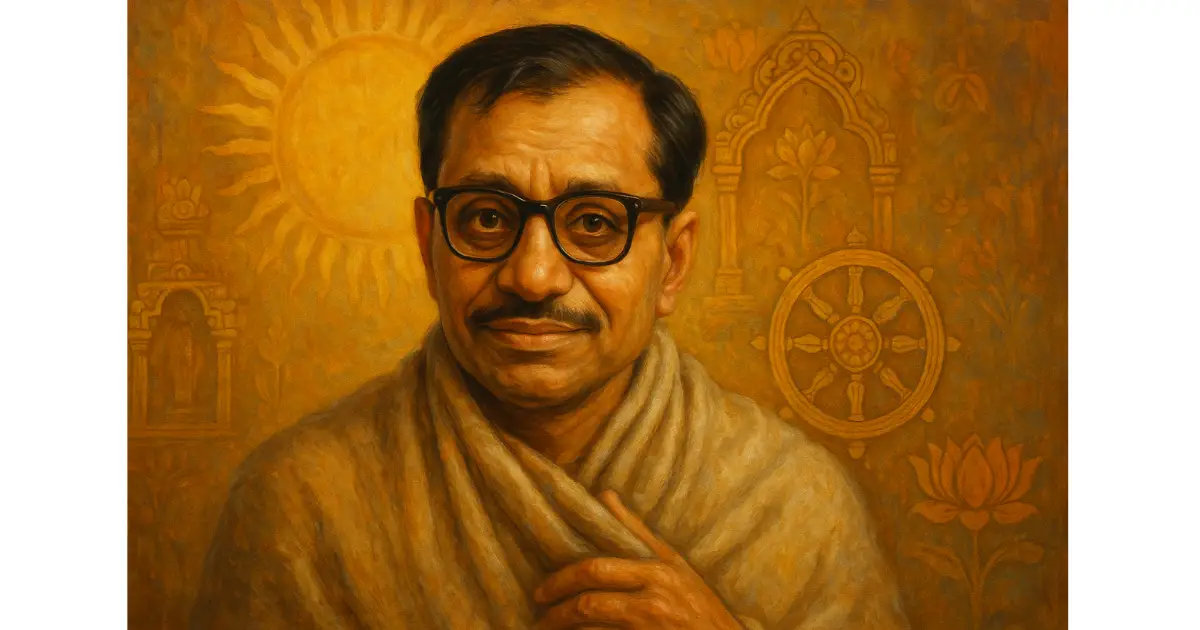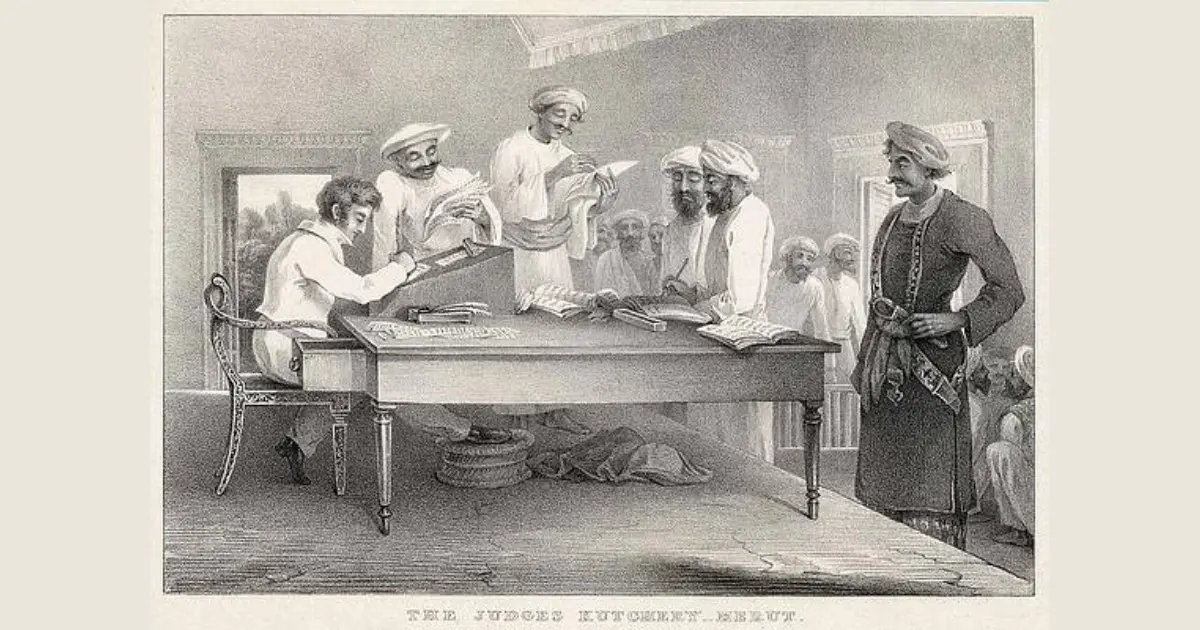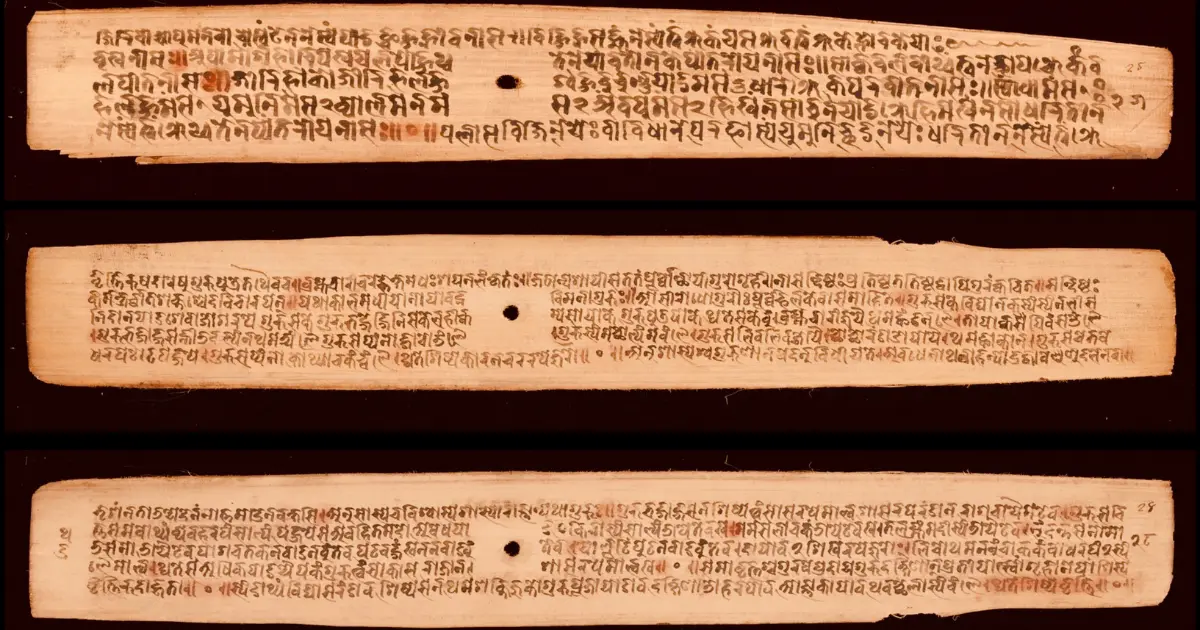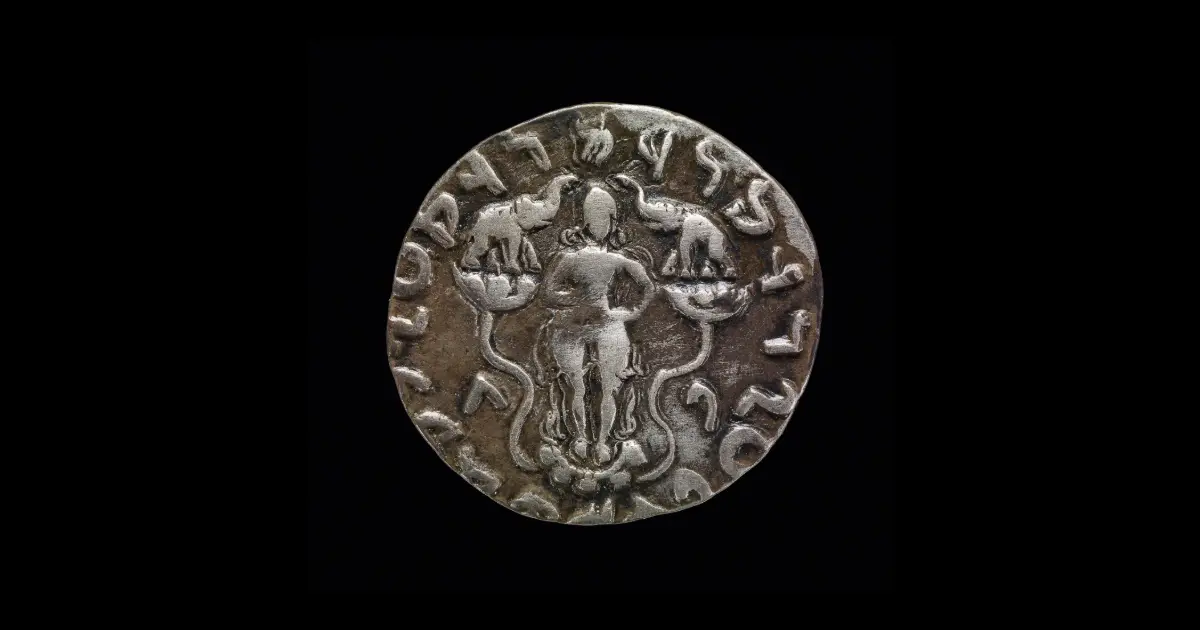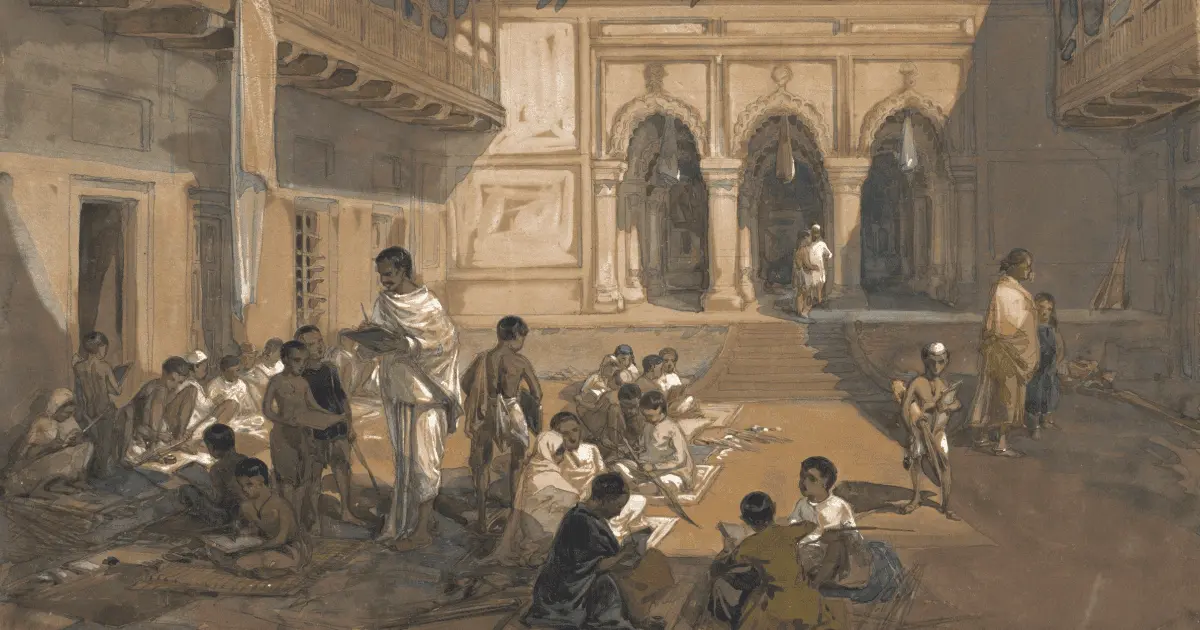tyāgaḥ satyaṃ ca śauryaṃ ca traya ete mahāguṇāḥ
Renunciation, truth, and courage—these three are great virtues.
When renunciation, truth, and courage form the foundation of governance, they reveal a nation and its functioning state rooted in the essence of Satya and Dharma, precisely as Pandit Deendayal Upadhyaya envisioned in his paradigm-changing philosophy of Integral Humanism or Ekātma Mānavavāda.
Integral Humanism has not arisen independently but is the modern flowering of an uninterrupted continuity of political thinking and intelligence which has developed in India since the dawn of civilization. This tradition has spanned millennia of philosophical thought on governance, the State, and the polity by Vedic seers, sages, and learned thinkers who have been ceaselessly developing this wisdom into progressively advanced political science.
The antiquity and richness of this tradition are seen from the earliest texts. The Chāndogya Upaniṣad mentions royal knowledge (rājavidyā) as ekayāna, reflecting the absolute significance given to political wisdom in Vedic thought. The mantra starting with pṛthivyai samudraparyantāyai proves that political ideas were central to the Vedic vision and not ancillary matters. These early beginnings made governance not just an administrative method but a sacred science that entailed a profound knowledge of cosmic order and human nature.
This intellectual heritage reached a significant synthesis in the work of Kautilya, whose Arthaśāstra was itself a compilation and refinement of existing knowledge rather than an original creation. As a contemporary verse indicates -
पूर्वमतानि यथेदं संगृह्यैकं चकार कौटिल्यः ।
टीकान्तराणि दृष्ट्वा सद्व्याख्यानं सुमुध्दृत्य ॥
Kauṭilya compiled one text after collecting earlier views and selecting the best commentaries after reviewing many.
This recognition uncovers that even prior to Kauṭilya, there were many commentaries and treatises on political science, indicating a rich tradition of continuous contemplation over governance that he formalized and systematized but did not begin. The Arthaśāstra is thus not the genesis of Indian political thought but one great milestone of its ongoing development.
Most importantly, this tradition never dissociated political sagacity from religious wisdom. Saints such as Samarth Ramdas and Tulsidas composed texts like Dāsbodh and Mānasarāmāyaṇa with the conscious aim of instructing all in political thinking. This blending of religious and political aspects guaranteed that the business of ruling never got dissociated from dharmic ideals but remained a continuity of practical-aspirational statecraft.
These pieces prove the tradition's adherence to placing political insight within reach of all and not limiting it to a privileged sphere. The deployment of vernacular language, narrative styles, and religious structures guaranteed that political awareness stayed rooted in common culture and moral imagination.
Integral Humanism is the natural contemporary expression of this unbroken tradition. Deendayal Upadhyaya's synthesis takes advantage of the same basic insights that have informed Indian political thought for millennia—the organic character of society, the dhārmika bases of government, the union of spiritual and temporal concerns, and the necessity of civilizational authenticity in political order.
Instead of being a departure from tradition or a bid to establish something totally new, Integral Humanism re-expresses old wisdom in new language and seeks to grapple with issues of contemporary concern. It upholds the tradition's distinctive method of accommodating timeless principles in circumstances that change and still holds to vital continuity with the vision of the civilization that has nourished Indian political imagination through an infinity of transformations.
During the contemporary period, this reaction received eloquent expression in the form of the vision and leadership of Pandit Deendayal Upadhyaya.
A political reformist of unprecedented will, vision, and intellectual genius, Upadhyaya was a great student, master organizer, writer, journalist, thinker, philosopher, authentic nationalist, and humanist of excellence. In the age of globalization and great ideological upheavals characterized by the failure of Marxism and the fragmentation of Western capitalist systems, his Integral Humanism is a civilizational option in a world further divided by the fault lines of these two incompatible ideologies.
Integral Humanism (IH) represents a comprehensive philosophical framework drafted by Pandit Deendayal Upadhyaya as both a political program and a civilizational vision. Adopted in 1965 as the official doctrine of the Jan Sangh—and later embraced by the Bharatiya Janata Party (BJP)—it stands as a genuine homegrown philosophy designed to illuminate India's path through indigenous solutions to indigenous challenges.
At its essence, Integral Humanism champions a holistic approach to human development that seamlessly integrates material progress with spiritual fulfillment. Rather than viewing these as competing forces, it envisions an indigenous socio-economic model where the human being—in all dimensions of existence—remains the focal point of development. The philosophy's cardinal objective transcends mere economic growth - it seeks to ensure a dignified life for every individual while maintaining the delicate equilibrium between personal aspirations and societal harmony.
Building upon this philosophical foundation, this essay investigates the practical application of Integral Humanism in today's policy arena, examining where theory meets implementation in modern India.
Deendayal Upadhyaya's philosophy of 'Integral Humanism' (Ekātma Mānava Darśana), introduced in 1965, presents an indigenous socio-economic model rooted in the Bhāratīya way of understanding governance, economic and political state that challenges Western economic models and prevailing political ideologies like Capitalism and Socialism. It aims to guide a newly independent India, focusing on a holistic approach to human development that blends material progress with spiritual well-being. This philosophy seeks to redefine development from an Indian civilizational perspective.
What emerges from Upadhyaya's vision is not merely another political doctrine, but a comprehensive worldview that addresses the fundamental question of human existence in organized society.
At its heart, Integral Humanism presents a radically different conception of development—one that refuses to separate the material from the spiritual, the individual from the collective, or progress from values.
Beyond the Western Paradigm*
The genius of Upadhyaya's approach lies in his recognition that neither capitalism nor socialism could adequately address India's civilizational needs. Where capitalism celebrated unbridled individualism at the cost of social cohesion, socialism crushed individual creativity beneath the weight of collective conformity. Both, in his view, suffered from a fundamental flaw - they presented only a partial view of man.
This critique runs deeper than economic theory. Upadhyaya observed that Western ideologies, whether capitalist or socialist, reduced human beings to economic units—producers, consumers, or workers—while ignoring their spiritual dimensions. They focused exclusively on kāma (desires) and artha (wealth) while neglecting dharma (righteous duty) and mokṣa (ultimate fulfillment). This reductionist approach, he argued, inevitably led to alienation, exploitation, and spiritual emptiness.
The contradictions within Western political thought reveal themselves most starkly in its three foundational pillars - nationalism, democracy, and socialism. These concepts, while individually compelling, create irreconcilable tensions when operationalized together. Nationalism, essential for collective identity and self-determination, inevitably generates international competition and conflict. The Western response—advocating for the dissolution of national boundaries in favor of global unity—remains a utopian aspiration that crumbles against the reality of multipolar geopolitics and deeply rooted cultural identities.
Similarly, democracy's promise of individual liberty becomes hollow when coupled with capitalist structures that systematically exploit the very individuals it claims to liberate. The West's answer—socialism—attempts to end capitalist exploitation but does so by severely curtailing the individual freedoms that democracy ostensibly protects. This creates a perpetual pendulum swing between liberty and equality, never achieving the synthesis that both require.
These internal contradictions expose a deeper truth - Western political thought, despite its global influence, lacks the philosophical coherence necessary to provide sustainable solutions for humanity's civilizational challenges. For Bhāratīyas, this recognition becomes crucial—not as a rejection of all Western insights, but as a call to rediscover our intellectual resources rather than remaining trapped in borrowed frameworks that cannot adequately address our unique civilizational needs.
The Architecture of Human Completeness
Integral Humanism's brilliance lies in its synthesis of the four puruṣārthas—the classical Indian understanding of human objectives. Unlike Western frameworks that often pit material and spiritual pursuits against each other, this philosophy sees them as complementary aspects of a unified human experience. This synthesis becomes particularly significant as Bhāratīya culture shapes our sociopolitical identity in the post-independence era.
As we continue shedding the intellectual yoke of foreign rule, true independence must be understood through the lens of our cultural renaissance. A state rooted in cultural authenticity doesn't merely contribute to material progress—it brings ānanda (joy) to governance itself. When policies emerge from indigenous wisdom rather than borrowed frameworks, they resonate naturally with the civilizational ethos, creating harmony between governance and the governed. This cultural grounding also provides us with a unique advantage - the ability to reinterpret Western thought through the Bhāratīya lens, extracting what serves us while discarding what conflicts with our fundamental nature.
The genius of Bhāratīya culture lies in its foundational understanding that embracing unity is the key to truly comprehending diversity. This isn't the superficial tolerance that merely accommodates differences, but the profound recognition that diversity itself is the expression of an underlying unity — ekaṃ sat viprā bahudhā vadanti (Truth is one, the wise express it in many ways). This principle transforms how we approach societal plurality, seeing it not as a challenge to manage but as a natural expression of civilizational richness.
Dharma serves as the foundation, not as a rigid moral prescription, but as the ethical compass that guides both individual conduct and governance. When leaders govern according to dhārmika principles, policies naturally align with justice, sustainability, and long-term welfare rather than short-term gains or partisan interests.
Artha represents legitimate material prosperity but within dhārmika bounds. This isn't poverty worship or material denial, but rather a wealth creation that serves human dignity and social harmony. Economic growth becomes meaningful only when it uplifts the most vulnerable, embodied in the principle of Antyodaya.
Kāma, often misunderstood as mere sensual pleasure, encompasses the full spectrum of human desires and aspirations. Integral Humanism doesn't suppress these but channels them constructively, recognizing that unfulfilled or misdirected desires can destabilize both individuals and societies.
Mokṣa, the ultimate objective, represents not escape from worldly engagement but the realization of human potential within it. A society oriented toward mokṣa creates conditions where individuals can pursue their highest possibilities while contributing to collective welfare.
This framework operates on the understanding that culture (saṃskṛti) is the conscious effort to mold nature (prakṛti) toward achieving noble social goals. However, when this natural creative force becomes distorted and leads to social conflict, it manifests as vikṛti—a deviation from the harmonious order. Integral Humanism thus becomes both a diagnostic tool for identifying societal distortions and a therapeutic framework for restoring civilizational health.
The Organic Society
Perhaps most revolutionary is Upadhyaya's conception of society as a living organism rather than a mechanical aggregation of individuals. This virāṭa—the collective manifestation of cultural consciousness—possesses its own citi or soul, just as individuals do. This isn't a mystical abstraction but a practical recognition that societies have emergent properties, cultural DNA, and evolutionary trajectories that cannot be reduced to individual preferences or imposed from above.
Citi - The Cultural Soul
Citi represents the inner essence or national soul of a civilization—its unique cultural identity and consciousness that transcends individual preferences and political impositions. Citi serves as the ultimate standard for determining the merits and demerits of any particular action or policy. Whatever aligns with our civilizational nature receives cultural approval and strengthens the social fabric. Conversely, whatever is rejected by citi manifests as cultural dissonance within the collective consciousness. In this sense, citi functions as the cultural touchstone of the civilizational state, providing the internal compass that distinguishes between policies that nourish civilizational growth and those that distort or diminish it.
Virāṭa - The Living Manifestation
Virāṭa complements citi as the living manifestation of national culture in societal institutions and collective life. While citi represents the inner essence, virāṭa is its tangible, visible, and functional expression in everyday governance, economic practices, and social interactions. Upadhyaya believed that every society has certain peculiarities which could be identified as virāṭa—the concrete ways in which the national soul expresses itself in the material world.
In the contemporary context, virāṭa encompasses -
Societal Institutions - How traditional values and the national soul are reflected in governmental bodies, educational systems, legal frameworks, and healthcare services. These institutions become vessels through which citi manifests in practical governance.
Collective Life - How civilizational values guide collective behavior, social norms, public discourse, and the overall ethos of the community. For instance, policies promoting sustainability could reflect a traditional respect for nature, demonstrating how ancient wisdom finds expression in modern policy frameworks.
Cultural Adaptation - The dynamic process by which indigenous values adapt to global influences and modern advancements while preserving their essential character, preventing the standardization and erosion of unique cultural expressions.
From Administration to Cultural Stewardship
This organic understanding transforms governance from mere administration to cultural stewardship and nurture. Just as a gardener works with natural growth patterns rather than forcing artificial structures, effective governance cultivates conditions for societal flourishing while respecting indigenous wisdom and local variations.
Policies and institutions that resonate with the national citi generate organic acceptance and sustainable implementation because they emerge from the civilizational soul itself. Those who violate this deeper cultural logic, regardless of their superficial rationality or borrowed credentials, create friction and ultimately fail to take root. The civilizational state thus becomes an authentic expression of the nation's soul rather than an external imposition upon it.
The Contemporary Challenge
In today's globalizing world, the challenge lies in ensuring that while adapting to modern realities, the virāṭa—the unique cultural manifestation of citi—is preserved and strengthened rather than eroded. This requires recognizing that true development comes not from abandoning civilizational identity but from allowing it to find new expressions that remain faithful to its essential character.
The interplay between citi and virāṭa thus offers a framework for authentic governance that honors both the unchanging essence of civilizational identity and its ever-evolving manifestations in response to changing circumstances. This creates a path toward modernity that is rooted in indigenous wisdom rather than derivative imitation.
Svadeśī - Beyond Economic Nationalism
The principle of svadeśī in Integral Humanism transcends narrow economic nationalism. It represents cultural self-confidence—the conviction that India's civilizational resources are adequate for addressing India's challenges. This doesn't mean isolation or rejection of global engagement, but rather engaging with the world from a position of cultural strength and clarity.
Contemporary supply chain disruptions, environmental crises, and economic vulnerabilities have vindicated Upadhyaya's emphasis on decentralized, locally-rooted production systems. Svadeśī anticipates what modern thinkers call resilience—the ability of systems to maintain functionality despite external shocks.
The Democratic Imperative
Integral Humanism's commitment to decentralization flows naturally from its organic understanding of society. Power concentrated at the center, whether in capitalist corporations or socialist states, inevitably becomes disconnected from ground realities and local needs. True democracy requires not just periodic elections but continuous participation in decisions that affect community life.
This vision of participatory democracy aligns with India's traditional Panchayat system while adapting to contemporary scales and complexities. It offers a compelling alternative to both authoritarian efficiency and chaotic populism—a structured yet flexible framework for collective decision-making.
Contemporary Resonance
As we witness the exhaustion of both unfettered capitalism and state socialism across the globe, Integral Humanism's third way appears increasingly prescient. Climate change, inequality, social fragmentation, and spiritual emptiness—the signature crises of our time—all reflect the partial worldview that Upadhyaya diagnosed decades ago.
The philosophy's emphasis on sustainability extends beyond environmental concerns to encompass social, cultural, and spiritual sustainability. In an era of rapid change and disruption, this comprehensive approach to resilience offers valuable guidance for navigating uncertainty while maintaining core values.
Modern India's policy landscape increasingly reflects these integral principles, though often without explicit acknowledgment. From rural development programs that combine economic opportunity with cultural preservation to initiatives that balance growth with environmental protection, the influence of this holistic thinking is evident across diverse sectors.
From Vision to Action - Integral Humanism in Policy Practice
While Integral Humanism presents a civilizationally rooted worldview, its practical resonance is increasingly visible in India's evolving policy frameworks. Rather than being limited to ideological discourse, IH offers actionable design principles for governance, social welfare, and sustainability. Its long-term relevance depends on its ability to shape public policy in a manner that is rooted, adaptive, and ethical. In India’s contemporary governance landscape, several initiatives, though not framed explicitly in the language of Integral Humanism, have begun to reflect its fundamental principles. These instances do not represent the full realization of its ideals, but they offer glimpses of a movement towards a more civilizationally aligned policy ethos.
Antyodaya in Action
The ideal of Antyodaya — the upliftment of the last person—has found articulation in various public welfare initiatives such as Jan Dhan Yojana, Ujjwala Yojana, and Ayushman Bharat.
Jan Dhan Yojana has brought over 55 crore individuals into the formal banking system as of 2025. With over ₹2.6 lakh crore in deposits and 1.26 lakh Bank Mitras supporting last-mile delivery, this initiative reflects a profound rethinking - that financial access is not a privilege, but a foundational duty of the State aligned with its citi. In rural Uttar Pradesh, for instance, Sunita Devi, a vegetable vendor, leveraged her Jan Dhan account to access credit and expand her business. Yet, dormant accounts and uneven financial literacy remind us that inclusion is not achieved by enrollment alone; it must be deepened through sustained civic engagement and cultural literacy.
Ujjwala Yojana has enabled over 10 crore households to shift from biomass to cleaner fuel, with refill subsidies helping improve adoption. This is more than a kitchen reform. It signals a structural correction in how public policy values women’s time, health, and agency—central to a civilizational model of human dignity.
Ayushman Bharat (PM-JAY) has provided ₹5 lakh per family per year for healthcare to over 12 crore families, drastically reducing out-of-pocket expenditure. The vision here is not charity, but dignity, where a daily-wage worker can undergo critical surgery without the trauma of debt. Yet, variations in state-level implementation and limited awareness in remote areas signal that Antyodaya, as a living dhārmika ethic, remains an evolving aspiration rather than an accomplished goal.
These efforts echo a long-overdue shift - from a top-down model of economic planning to one that begins at the margins. They reflect an understanding that dignity and access are not luxuries to be extended later, but prāthamika kartavya - primary duties in the dhārmika order of governance.
Svadeśī in a Global Context
Similarly, the svadeśī principle, often misunderstood as economic protectionism, is being reimagined through India’s push for self-reliance under the Atmanirbhar Bharat initiative. The emphasis on local manufacturing reduced import dependence, and community-scale production systems reflect IH’s insistence on indigenous capabilities. However, navigating this vision within a globalized economy presents complex trade-offs. The pursuit of economic autonomy must coexist with the realities of global value chains, foreign capital, and technological interdependence. In that light, the task is not merely to reduce dependence, but to evolve institutional forms that embody cultural resonance, economic justice, and ecological harmony. In a globalized, interdependent world, this is not a call for isolation but for rooted engagement.
Dharma in Governance - Reframing Education
Efforts to integrate dharma, not as a religious code but as ethical clarity, into governance have taken modest steps through the National Education Policy (2020). The policy’s emphasis on holistic learning, inclusion of Indian knowledge systems, and value-based education attempts to re-anchor education in a framework that sees the human being not merely as a future employee, but as a full person with moral, emotional, and intellectual needs. However, the task of translating dhārmika vision into pedagogical practice is complex. It demands more than curricular revision; it calls for a transformation in how we understand the relationship between learning, identity, and societal purpose. Dharma in policy requires us to ask - Are we nurturing self-aware, ethically grounded citizens or just skilled workers?
Swaraj and Decentralization
Decentralization has often been pursued through the language of efficiency. IH asks us to reframe it through the language of self-rule and local wisdom. e-GramSwaraj and SVAMITVA are steps in this direction. With over 2.5 lakh Gram Panchayats digitized, e-GramSwaraj has enabled participatory planning and budget transparency. SVAMITVA, with over 1 crore property cards issued, has helped citizens like Ram Singh in Madhya Pradesh use digitized land titles for credit access.
Yet, these platforms often stop at administrative decentralization. Decision-making power still flows from the center outward. True swaraj, as envisioned by Upadhyaya, demands not only administrative delegation but moral decentralization—where citi flows through local institutions, and virāṭa finds expression in daily civic life.
Urban Development - Artha Anchored in Dharma
Even in the domain of economic planning and urban development, we find glimpses of IH’s call to balance material prosperity (artha) and legitimate desire (kāma) within the bounds of dharma. The Smart Cities Mission offers a limited, yet instructive, example. Cities like Varanasi have integrated heritage preservation into infrastructure renewal, benefiting over 3 million residents while honouring cultural memory. Yet, many urban projects remain elite-driven, shaped more by global design aesthetics than by rooted urban imagination.
Integral Humanism does not oppose modernity; it insists that modernity be reinterpreted through our own categories of meaning. For urban development to truly reflect IH, it must centre community voices, ecological continuity, and cultural coherence.
Together, these case studies reveal a quiet, uneven, yet perceptible movement - from policy as programmatic delivery to policy as civilizational expression. The quantitative metrics—55.64 crore Jan Dhan accounts, 103.3 million LPG connections, and 36.9 crore Ayushman cards—tell one part of the story. But the qualitative shift, from entitlements to dignity, from access to participation, from efficiency to ethical coherence, is where the deeper promise of Integral Humanism resides.
To move from scattered resonance to systemic coherence, India must reimagine its policymaking not merely as management of growth, but as an expression of dharma. This requires institutional redesign, culturally rooted thinking, and a shift in purpose—from transactional delivery to ethical alignment. Only then can Integral Humanism evolve from a visionary text to a living, animating force in the soul of the State.
Challenges in Adapting Integral Humanism to Modern Governance and The Fallibility of Western Secular Universalism
Despite its theoretical coherence, translating Integral Humanism into practical policy faces several difficulties in contemporary socio-political landscapes, stemming from contradictions with religious, local, and global orientations that demand honest acknowledgment before authentic solutions can emerge.
Integrating Spiritual Values in Secular Governance - Modern democratic states often operate with separation between religion and politics to maintain neutrality. IH's emphasis on moral and spiritual ethics, particularly dharma, can conflict with this secular approach. In pluralistic, multicultural societies with diverse religions and belief systems, imposing one spiritual or ethical framework may lead to exclusion, antagonism, or conflict among different population sectors, potentially violating citizens' rights.
Decentralization vs. Centralization - While IH promotes decentralized governance and local autonomy, modern nation-states tend towards centralized political and economic power for perceived efficiency, consistency, and coordination. Practical challenges include bureaucratic inefficiencies, corruption, political resistance to devolution of power, and local governments lacking sufficient resources and expertise. This can lead to uneven development, with richer regions performing better than poorer ones. Essential state functions like defense, finance, and taxation often remain centralized, limiting the feasibility of IH's decentralization vision.
Economic Self-Reliance (Svadeśī) in a Globalized World - The principle of svadeśī faces significant challenges in a globalized, integrated world economy that relies on exports, foreign direct investment, and transnational corporations for growth. International markets often dominate local ones with lower prices, hindering local entrepreneurs. Efforts to achieve economic autonomy can lead to reduced access to foreign credit, technology, and markets, potentially resulting in economic stagnation.
Cultural and National Identity in Pluralistic Societies - IH's concept of spiritual nationalism, aiming to integrate society through shared responsibility and respect, can be difficult to implement in culturally and religiously diverse societies. Different communities may hold varying visions of the nation, potentially leading to feelings of discrimination if a dominant vision based on one set of cultural-national values is enforced.
However, these challenges, while real, often emerge from attempting to implement IH within frameworks that are themselves culturally conditioned and potentially inadequate. The conventional approach of reinterpreting Integral Humanism's spiritual values to align with universally recognized secular values like justice, equality, and sustainability rests on a problematic assumption - that Western secular frameworks represent universal truths rather than culturally specific constructs that have their own limitations and failures.
However, Western secular ideas are equally fallible and culturally conditioned. The very concepts of justice, equality, and sustainability as understood in Western secular discourse carry embedded assumptions about human nature, social organization, and the relationship between individual and collective that may not resonate with—or may even contradict—the deeper insights of Integral Humanism.
Toward Functional Integration Through Bhāratīya Dṛṣṭi
Rather than either abandoning IH due to these challenges or forcing it into Western secular molds, a more authentic approach requires developing a Bhāratīya dṛṣṭi — an indigenous worldview that can address these practical difficulties while maintaining philosophical integrity. This perspective recognizes that the apparent contradictions often arise from imposing alien frameworks rather than developing indigenous solutions.
Addressing the Spiritual-Secular Divide - Instead of accepting the Western premise that spirituality and governance must be separated, a Bhāratīya approach recognizes that dharma transcends Western notions of both religion and secularism. While Western justice often focuses on individual rights and procedural fairness, dharma encompasses cosmic order, social harmony, and the fulfillment of one's essential nature within the larger civilizational context. This provides a more holistic understanding of righteousness that can unite rather than divide diverse communities around shared principles of righteous governance.
Reimagining Decentralization - The challenge of centralization versus decentralization dissolves when viewed through the lens of Integral organization. Rather than seeing centralization and decentralization as opposing forces, IH suggests organic coordination where different functions operate at their natural levels. Essential functions like defense and coordination remain centralized, while cultural, economic, and social functions flourish at local levels. This creates subsidiarity based on civilizational wisdom rather than administrative efficiency.
Transforming Svadeśī for Global Engagement - Rather than seeing *s*vadeśī as isolationist self-reliance, it can be reinterpreted as interdependent self-strength—building robust local capacities that can engage globally from a position of strength rather than dependence. This approach seeks to create resilient local economies that can benefit from global connections without being dominated by them, much like how traditional Indian philosophy engages with diverse influences while maintaining its essential character.
Redefining Secularism - The integration of IH principles requires reconceptualizing secularism itself. The Western model of secularism, which seeks to exclude spiritual considerations from public life, may be inappropriate for civilizations where the sacred and temporal have always been interwoven. A Bhāratīya understanding of secularism might instead emphasize -
Vasudhaiva Kuṭumbakam - The recognition that the world is one family provides a foundation for inclusive governance that honors diverse spiritual traditions while maintaining unity of purpose. This allows for the inclusion of spiritual wisdom in governance while fostering genuine civilizational dialogue.
Spiritual Pragmatism - Recognition that spiritual principles can provide practical guidance for social organization without imposing theological orthodoxy. The emphasis shifts from doctrinal uniformity to functional wisdom.
Civilizational Authenticity - Policies and institutions that emerge from indigenous spiritual-ethical foundations rather than imported secular frameworks, even when addressing contemporary challenges. From this Bhāratīya dṛṣṭi, the reinterpretation of spiritual values doesn't mean conforming to Western secular standards but rather demonstrating how indigenous wisdom can address universal human concerns more effectively -
Justice becomes Dharma-based governance - Decision-making processes that consider not just individual rights but the harmony of the whole, the needs of future generations, and the cosmic order.
Unity in Diversity Through Dhārmika Pluralism - The challenge of spiritual nationalism in pluralistic societies can be addressed through the principle of vasudhaiva kuṭumbakam — recognizing the world as one family while respecting diverse expressions of this underlying unity. This differs from Western multiculturalism, which often creates parallel communities by fostering genuine integration around shared dhārmika principles that can accommodate diverse cultural expressions.
Sustainability evolves into Yajña-based economics - Economic systems that operate on principles of reciprocity, restraint, and reverence for natural cycles rather than merely efficient resource allocation.
This approach allows IH principles to engage with global discourse without losing their essential character. Rather than asking How can we make these spiritual values acceptable to secular systems? the question becomes How can these spiritual insights contribute to addressing human challenges in ways that secular approaches have failed to achieve?
This reframing positions Integral Humanism not as a regional variation of universal secular themes but as a distinctive contribution to global wisdom that can enrich rather than conform to existing paradigms. It suggests that authentic universalism emerges not from the imposition of one cultural framework but from the dialogue between different civilizational approaches to common human challenges.
The integration of IH into contemporary governance requires neither the abandonment of spiritual wisdom nor its subordination to Western secular categories. Instead, it demands the development of a confident Bhāratīya dṛṣṭi that can articulate indigenous insights in ways that demonstrate their relevance to global challenges while maintaining their philosophical integrity. This approach transforms the conversation from defensive accommodation to creative contribution, positioning India not as a recipient of universal values but as a contributor to their evolution.
